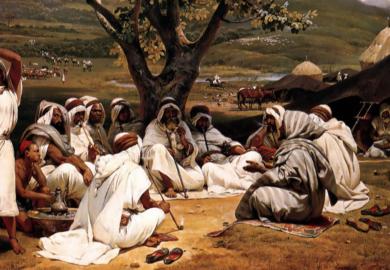What did Christian intellectual figures say about Imam Ali, may God bless his face? (2)
Paul Salameh.
Paul Salameh, a Christian poet, scholar, journalist of Lebanon, was an accomplished scholar, capable writer, great poet, and famous lecturer. During his life, he attracted
the attention of contemporary poets, scholars, and religious and cultural-figures. His works include Imam Ali Imam and Hussain, 1946; Palestine and Sisters, 1947; Prince Bashir, .1947; Ghadir, 1948; Modern Eve, 1949; Injured Memoirs, 1950; Conflict in Existence, 1952; Life Story, 1961; Bread and Salt, 1966; With Christ, 1967; From My Balcony, 1967; Under the Oak, 1968; In This Timer, 1970. [12, p. 349-350; 13, p. 18-22] One of Salameh’s prominent works is Eid al-Ghadir, a poem of 3500 verses, which reveals the events of Islam as relating to Imam Ali. The poem begins by describing the Pre-Islamic Period, otherwise known as the Jahili or the Ignorance Period, and ends by describing the events of Karbala and the martyrdom of Imam Hussain. Salameh, in the introduction to al-Ghadir, speaks of Imam Ali’s eloquence: “It’s enough for a lecturer to stand on the slope of a mountain, / Lift his head up
and then have verses flow, / For his tongue to get familiar with clear Arabic words, / Words whose rules Ali, the Father of Hassan, has revealed,” thus at the end of that introduction, Salameh bows and explains: “In truth my words and expression bow down to you, / As my poem is a gravel to you, the Lord of Speech.” [14, p. 12.] Salameh distinguishes Imam Ali as, the Lord of Speech and the Originator of Eloquence after Prophet Muhammad. In his opinion, Nahj al-Balagha and the words of Imam Ali are a vast ocean wherein souls commune and convene, such comprehensive words that sometimes become soft and gentle, so that the ear and heart avail the best and the most by their beauty, and sometimes Imam Ali’s very own words become so strong and overwhelming and exciting as if a volcano has erupted.
“After Prophet Muhammad, also known as Taha, / Ali is the righteous Lord of speech, his brother, his son in law, / He is like a sea in which souls and lives come together, Your words in elegances benefit the ear and heart as the echoes of appreciation exist in it, / He sends forceful words as flames, as from the depth of a volcano, / And, when he speaks with humility, / His gentle words are like such a charm, / That tolerance takes on disgrace in its soft, tender glow.” [14, p. 184-185] Paul Salameh in his article, Imam Ali: The Lord of Speech, refers to the words and rhetoric of Imam Ali. He bring some words of Imam Ali and comments on them and expresses his wonder. In his article, Salameh says, “I cannot think of any soul skilled at eloquence, who has not learned that given eloquence from a source other than the Holy Quran, the words of Prophet Muhammad or Imam Ali’s. Those who have not been the direct students of Imam Ali, have surely learned from his students.” [15, p. 19].
Henry Corbin.
Henry Corbin was a philosopher, theologian and professor of Islamic Studies He is a German orientalist that has authored valuables work on mysticism and Sufism. Among his work are History of Islamic Philosophy; Iranian philosophy and Comprehensive Philosophy; Iranian Islam [16, p. 89-91]. Professor Henry Corbin writes:
Nahj al-Balagha, after the Quran and Prophet Muhammad’s tradition, has prime
importance, not only as a general foundation for Shia religious life, but for the
philosophical and intellectual tradition of the Shia. For this reason, we can consider
Nahj al-Balagha as one of the most important sources of doctrine to have come under
close attention as a basis of education by Shia scholars and thinkers, especially in the
fourth period. The status and effect of this book relates to its doctrinal aspects aimed at setting logical relationships in the world, establishing a correct approach of arriving at conclusions, creating technical terms in Arabic: terms of such great beauty, literary and philosophical richness to have entered the Arabic language. All of these are independent from the Greek texts that have been translated to Arabic, and as such this book is the source of organization and a special form of Shi’a philosophy. The Shia have copied from this book all the content that are related to theology, for the words of Imam Ali form a complete philosophical system. [17, p. 18]
Amin bin Rashid Nakhla.
Amin bin Rashid Nakhla is a Christian lawyer and poet who was born and educated in Beirut. He graduated from Damascus Law School. He was a journalist, lawyer, and a man of politics as well. His works include The New Diwan and The Books of
Ghazals, A Books of Emergency Law, The Rustic Memoir, Under the Bond of Aristotle. [3, p. 408] Professor Amin Nakhla writes about the sayings of Imam Ali in Nahj al-Balagha: “If everyone wants to cure their souls of disease, / They should learn Nahj al-Balagha and tread under its light” [17, p. 18]. Nakhla’s answer to a person who asks him a few words about Imam Ali to gather and publish in a book: You have asked me to choose 100 speeches of the most eloquent person among Arabs, that is, Imam Ali, the Father of Imam Hassan, for you to publish in a book. I do not
have access to such a collection, but the only source I can introduce is the Holy Bible of Arabic rhetoric called Nahj al-Balagha. I have thumbed this book with great pleasure, by God. I don’t know how to choose from among the words of Imam Ali only 100. I do not know how to detach one word from another, it is like picking up a precious ruby grain sitting next to another equally priceless grain. I finally did that, while my hand shook back and forth with the bright rubies dazzling my eyes with such staring divine and heavenly light. It is surly unbelievable, for the astonishment and confusion I had to endure for attempting to single out words from the spring and fountain of rhetoric. Verily, the gift and bounty that Allah has bestowed on Arabic literature and Arab societies is far more than these 100 words. [18, p. 39-40]
Mohammed bin Nael Hassan El Marsafy.
Mohammad bin Nael El Marsafy was raised in Cairo and educated in al-Azhar and Darul ‘Ulum. In Freire School he was appointed as teacher and he published Al-Jadid and Shahrezad magazines. His works include Innovation in Dictation, Pearls
in Composition, and Literature in Arabic [8, p. 234]. El Marsafy, a venerated professor of Egyptian literature, describes Nahj al-Balagha:
God has appointed Nahj al-Balagha as a clear evidence that Imam Ali is the best sample of the sparkling light, wisdom, guidance, miracle and eloquence of the Holy Quran. In Nahj al-Balagha, Imam Ali possesses such signs of full wisdom, evidence of correct policy, clear advice, and expressive reason that great sages and foreign philosophers don’t embrace. Herein, Imam Ali has traversed and absorbed the depths of science, politics, and religion, and in all these realms he is an accomplished genius. [19, p. 291]





